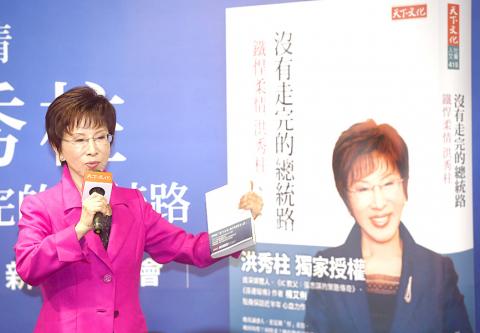Deputy Legislative Speaker Hung Hsiu-chu (洪秀柱) yesterday said that it would be a “lie” to say that she had put the controversy over her failed presidential bid completely behind her.
Speaking at the Taipei launch of her book, Unfinished Presidential Road, Hung said: “I wish the title of the book were different from what it is now. I would be lying if I said I am not sorry [over how things turned out], but I have to say I have no regrets or complaints.”
Hung was referring to the Chinese Nationalist Party’s (KMT) decision to rescind her candidacy in mid-October, almost three months after her nomination as the party’s official candidate on July 19. Citing her low poll ratings, the KMT replaced her with party Chairman Eric Chu (朱立倫).

Photo: Fang Pin-chao, Taipei Times
Hung said she had “vigorously visited different places when she was the candidate although [her] legs are short.”
“Under the young master [shaoye, 少爺], we now have a different and better fate,” she said, referring to Chu, betraying a hint of bitterness with her choice of words. “I have finished off the bitter days for him. I hope he can fare better down the road.”
Asked whether she has been invited to the opening of Chu’s campaign headquarters on Saturday, Hung said she had not yet received an invitation.
“However, that is a good day [according to the traditional calendar], so even if I am invited, I would go to those places where I am needed the most, such as the party’s legislative candidates’ rallies, as Chu’s event would certainly be crowded by heavyweights,” she said.
Hung also reiterated her cross-strait policy, saying that although it is not wrong to uphold “one China, different interpretations,” it could only maintain a fragile cross-strait relationship, but not a stable one.
“It is a pity that the idea did not have the ear of our comrades, and that is what I find the most regretful,” she said.
Hung had championed the new idea of “one China, same interpretation” during her campaign, which was also one of the reasons she was ousted, as KMT headquarters viewed it as “going against mainstream public opinion.”
She said she also found it extremely upsetting when she was discouraged by others, saying that Taiwanese are “gullible and difficult to teach,” when she was trying to promote her ideas.
“If [the saying] is true, then it all the more needs to be changed,” Hung said.

CHAOS: Iranians took to the streets playing celebratory music after reports of Khamenei’s death on Saturday, while mourners also gathered in Tehran yesterday Iranian Supreme Leader Ayatollah Ali Khamenei was killed in a major attack on Iran launched by Israel and the US, throwing the future of the Islamic republic into doubt and raising the risk of regional instability. Iranian state television and the state-run IRNA news agency announced the 86-year-old’s death early yesterday. US President Donald Trump said it gave Iranians their “greatest chance” to “take back” their country. The announcements came after a joint US and Israeli aerial bombardment that targeted Iranian military and governmental sites. Trump said the “heavy and pinpoint bombing” would continue through the week or as long

TRUST: The KMT said it respected the US’ timing and considerations, and hoped it would continue to honor its commitments to helping Taiwan bolster its defenses and deterrence US President Donald Trump is delaying a multibillion-dollar arms sale to Taiwan to ensure his visit to Beijing is successful, a New York Times report said. The weapons sales package has stalled in the US Department of State, the report said, citing US officials it did not identify. The White House has told agencies not to push forward ahead of Trump’s meeting with Chinese President Xi Jinping (習近平), it said. The two last month held a phone call to discuss trade and geopolitical flashpoints ahead of the summit. Xi raised the Taiwan issue and urged the US to handle arms sales to

BIG SPENDERS: Foreign investors bought the most Taiwan equities since 2005, signaling confidence that an AI boom would continue to benefit chipmakers Taiwan Semiconductor Manufacturing Co’s (TSMC, 台積電) market capitalization swelled to US$2 trillion for the first time following a 4.25 percent rally in its American depositary receipts (ADR) overnight, putting the world’s biggest contract chipmaker sixth on the list of the world’s biggest companies by market capitalization, just behind Amazon.com Inc. The site CompaniesMarketcap.com ranked TSMC ahead of Saudi Aramco and Meta Platforms Inc. The Taiwanese company’s ADRs on Tuesday surged to US$385.75 on the New York Stock Exchange, as strong demand for artificial intelligence (AI) applications led to chip supply constraints and boost revenue growth to record-breaking levels. Each TSMC ADR represents

State-run CPC Corp, Taiwan (CPC, 台灣中油) yesterday said that it had confirmed on Saturday night with its liquefied natural gas (LNG) and crude oil suppliers that shipments are proceeding as scheduled and that domestic supplies remain unaffected. The CPC yesterday announced the gasoline and diesel prices will rise by NT$0.2 and NT$0.4 per liter, respectively, starting Monday, citing Middle East tensions and blizzards in the eastern United States. CPC also iterated it has been reducing the proportion of crude oil imports from the Middle East and diversifying its supply sources in the past few years in response to geopolitical risks, expanding